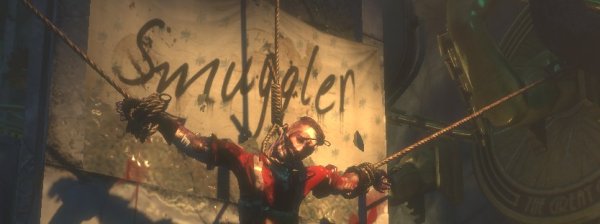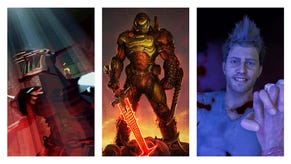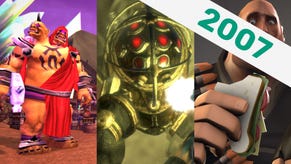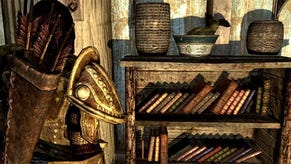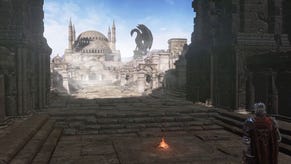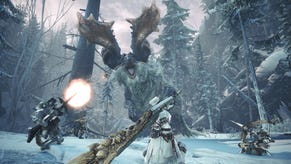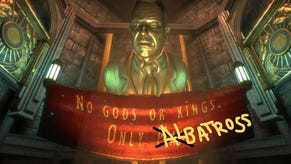Keeping Up With Ken Levine
Sometimes, we like to race. Today, John won, throwing up his thoughts on Ken Levine's recent post-mortem natterings about Bioshock's narrative before I could lay my oafish mitts to a keyboard.
After literally seconds of consideration, I've decided to do so anyway, as a) John's kindly gotten the hard labour of summary and quotation out of the way for me and b) I've got some slightly different feelings about what Levine's said/is maybe trying to say/perhaps failed to say. This isn't at all a rebuttal to John's piece, though there are inescapable elements of point-counterpoint.
Apologies, by the way, if we've gone a little September 2007 today: Bioshock's one of those games that never quite goes away.
Apologies also if this is a bit rambly. I do like a good ramble.
First, what Levine says in his GDC speech is overwhelming positive, as far as I'm concerned. He's saying that, although they need to be plot-simple to sell well and to have an overarching sense of purpose, mainstream action games should also build in a second layer of narrative to reward the more passionate player. While I have other arguments about the enormous problems even the finest fixed narrative can burden a game with, I think it's safe to say that anyone reading RPS should be gladdened by that. Game plots have to be simple if they want mass appeal and a sense of focus to the whole endeavour - but throw in something meaty to reward the more attentive and/or analytical player too.
Granted, Levine's a little less flattering to those guys (us guys) - ""You know how there are kids who listen to music, like it, dance it and get into it, but then there's that weird kid in the back of the classroom who'll be writing all the Nirvana lyrics on his notebook? That's the level of the people who get into the game that you have to support." Yeah, thanks Ken. Nevertheless, we're important, and should be catered to: awesome, awesome, a thousand awesomes.
What Levine doesn't say, whether by accident or designed ommission for the sake of conciseness is that there's also a third strata of narrative in Bioshock. As bedrock, you've got your hunted, hunter, hunted, hunter and END core story, the one that actually drives the player onwards - which is nothing whatsoever to do with how smart the player is, but rather essential to give absolutely everyone an overarching sense of purpose. This is, after all, a videogame, not a novel. Sprinkled over the top of that you've got your fansite-friendly backstory of Rapture and nods to Ayn Rand, info-morsels for the players who want to deliberately employ their brains as well as their reflexes and base emotions. Just don't let that stuff overwhelm the rest of the game, as most people plum don't care.
In the middle is something else altogether, and the "miscalculation" that Kotaku chooses to interpret as an admission of failure. (By way of demonstrating my disagreement with someone claiming that's what Levine said, an anecdote. I was playing Audiosurf during a visit to the PC Gamer office today, having another crack at winning the Wuthering Heights war without end. "SHIT", I blare. "Cocked it up, eh?", jibes Editor Ross. "No, it was a near-perfect run - I just didn't beat Kieron's score." "So, you cocked it up." he winks back. "Grrrrrrno'snotfairfckingkieron", I mutter, or words to that effect. EdiRoss was jesting, of course, but the point is there's a country mile of difference between FAILED and 'could have done it better'. I do personally believe that Bioshock's ending failed - but that wasn't what Levine said.)
Anyway, the middle strata is the story of Jack, Bioshock's protagonist. It's a separate narrative entirely to both the story of Rapture, and to the story of Bioshock's player.
SPOILERS BEYOND: If you haven't played Bioshock through yet, stop reading when you see the kittens, and start reading again when you see the bear.

Photo by freeparking
Jack's story is, for all the readings about post-modern commentary on the nature of first-person shooters, at heart pure sci-fi melodrama - straight out of Heroes or Spider-Man or something that's similarly joyously pulpy. You've been mind-controlled all this time, you're actually the son of the bad guy, except the bad guy's not the real bad guy... It's pure Hollywood plot-twist - and particularly effective Hollywood plot-twist at that - so it appeals most to the people who just enjoy fun fiction.

Photo by artct45
There's absolutely some crossover with the mindset that most enjoys shooting zombies and the mindset that most enjoys obsessively mapping out Rapture's socio-political make-up, but those who are there primarily to Find Out What Happens are, I suspect, are a sizeable third group of their own (I count myself amongst their number, for the record). Were I in the habit (and I am) of stretching an analogy too far and knowingly misusing terms because it sounds good, I'd say Bioshock has separate narratives for the id, the ego and the superego. Shoot all the monsters/want to find out what happens/analyse why it happened.
Where I strongly feel his GDC speech doesn't at all contradict his Kotaku interview is that his lead argument remains, in either case, the vast majority of people do not care about your silly story. Levine was doubtless booked for the slot with some expectancy that he'd jaff off about Objectivism or identity or something, and his reponse was to say, no, cleverthinks and soap operas are not the be-all and end-all of a game's greatness and success. The action and the theme - and also the aesthetic, as Bioshock has successfully proven in the face of a thousand Killzones or Conflict: Denied Ops and suchlike - is still what sells hundreds of thousands of copies and keeps the player playing.
The "miscalculation" mentioned in the Kotaku interview is giving the pulpy middle layer of the driving narrative short thrift - suddenly curtailing that intriguing undercurrent to the game while leaving the shooty action running onwards. The basic story was more effective than intended - Levine underestimated how much some people would care about it, so didn't think to round it off with finesse. And yet a more complex narrative did continue past That Moment - specifically the Sister/Daddy training labs seen in the late game, which very effectively flesh out the game's signature foes with primarily visual cues.
When Levine says no-one cares about your silly story, he means don't let reams of fine detail - which in Bioshock take the form of the audio diaries - direct the game. The player's immediate goals matter more than knowing what year Fontaine was born in. So Bioshock succeeds on the most important level - action with purpose - but the middle thread, Jack's story, is pushed aside too soon, leaving a very vocal minority (again, myself included) unsatisfied. Bioshock simply didn't synchronise its threads well enough. As has been reported, the Jack story arc came very late in Bioshock's development - and that's no doubt why it's not as intermingled with the other two narrative threads as it could be. As he admits to, the middle thread stops well before the game ends, the story of Jack and the story of Rapture completed in advance of the story of the player, so the weird Nirvana kids suddenly find themselves left with only a repeated la-la-la refrain until fade-out, and no more lyrics to scribble in their notebooks.
Another problem is that key elements of the top thread, the Rapture backstory, are oddly disassociated from the other two. The audio diary collection mechanic is distractingly abstracted to the events of the game - you can feel smug by collecting them all, keeping some notes in your head and reordering it all into a bigger picture, but that's not the same as logically fitting into and around an effective beginning, middle and end core narrative. I'd blame that on the use of dirty great tape recorders left in patently absurd places. The silly backstory about Lord Whatever of Elf-Land, which Levine posits should never get in the way of the core player purpose, is so glaringly signalled in Bioshock that it almost breaks the fourth wall. It's hard to tell whether Levine's talking about how he made Bioshock or what he learned from making Bioshock - the awkward treatment of the audiologs has me suspecting the latter.
There's a ton of deep and fascinating information in Bioshock for those who wish to know it, and the more curious player should certainly be grateful that Bioshock has such a detailed passive narrative alongside its active narrative. I just wish there'd been a slicker way of incorporating it than randomly scattering pages torn from a history book all over a theme park. I mention again the Sister/Daddy training labs, and how much detail and atmosphere they gave to some of the game's key elements - and all told logically within the game's world, rather than using an artificial device to spew optional exposition at the player. Half-Life 2 takes a similar approach to backstory (even so, I find HL's world far less compelling than Rapture's), and it seems to me the most effective way of simultaneously pleasing both Shoot All The Monsters guy and Why Am I Shooting All The Monsters And How Should I Feel About It guy.
Had all the narrative layers concluded in some sort of tandem rather than at different points entirely, the ending wouldn't have felt as vacuous and anti-climatic as it did. That core Beat The Bad Guys purpose is the most important narrative to Bioshock, or any action game, but he underestimated how much the other two strata would matter to a sizeable subset of players.
So Levine's intentions are fine ones, and I'm enormously glad he said what he said: again, "man behind very successful game says put stuff in for the passionate gamers as well as the triggerhappy ones" can only be a positive thing. However, I think Bioshock's execution of this idea stumbled in its closing hours. That Levine is admitting to this, obviously aware that he's on the right track but needs to tread it a little more firmly, is great news. And while all his recent talk could be read as contradictory or as damning to Bioshock, it's made me anticipate whatever his next game turns out to be all the more.
[Edited a little for more clarity and less repetition post-posting]



